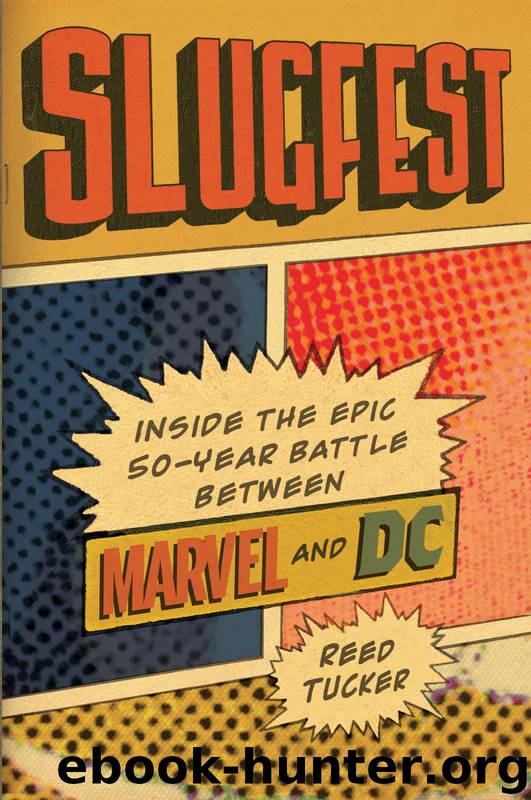Slugfest by Reed Tucker

Author:Reed Tucker
Language: eng
Format: mobi, epub
Publisher: Da Capo Press
Published: 2017-10-03T00:00:00+00:00
DC’s Big, Bold Gamble
“I remember hearing that DC was going to focus most of their sales on the direct market. And once I heard that, I turned to [editor] Mark Gruenwald and said, ‘We won’t have to worry about them anymore.’ I thought it would be the end of DC comics.”
—Former Marvel editor-in-chief Tom DeFalco
By the early 1980s it became clear that Marvel was beating DC at its own game. DC had introduced the American superhero, but in decades since, Marvel had done it better and rocketed ahead. To stay relevant, DC needed a new way forward.
It would start with the creation of a momentous miniseries, one that would impose sweeping changes on the previously staid DC universe and ultimately become one of the most important publications in the company’s history.
Continuity had always been a bugaboo at DC. Unlike at Marvel, whose universe was mostly created in a few years by a small handful of people, DC’s world had been haphazardly assembled piecemeal over the decades without an overriding plan or a single guiding voice. As a result, its in-story history was rife with inconsistencies. Marvel’s Jim Shooter once joked that it was like “a Swedish movie with no subtitles.” In a single month in 1974, for example, the Atom declares in an issue of Action Comics that he’s unable to shrink inanimate objects; over in an issue of The Brave and the Bold, however, he’s shown minimizing a camera.
To most of us that mistake would be no big deal. We’re well aware that a story about a man who can shrink to the size of a dust mite isn’t exactly a documentary. But to the hardcore fans this lack of cohesive continuity was a major annoyance. As DC began catering more to the direct market, these hardcore readers who made up the bulk of it became far more important. Those inconsistencies, which once were simply confusing, now threatened to harm DC in the marketplace.
“Don’t put conflicting books on the stand at the same time so the kid can … decide, ‘I’m going to read Marvel where things make sense,’” DC writer Marty Pasko said in 1977. “And then DC loses its audience.”
This lack of cohesion also gnawed at writer-editor Marv Wolfman, the man behind the hit New Teen Titans who’d come over to DC from Marvel in 1980. His worries grew more pronounced when, in 1981 while editing Green Lantern, he received a letter from a reader complaining about a particular story hole from a recent issue. An obscure sci-fi hero had failed to recognize Green Lantern even though they had been shown meeting in an issue three years earlier.
The letter got Wolfman thinking about how to clean up the DC universe. During a train journey he began plotting a far-reaching series he called The History of the DC Universe that was intended to take DC’s jumbled continuity and create a single, clean timeline in its place. He pitched it to DC the following Monday and was given the green light.
Download
This site does not store any files on its server. We only index and link to content provided by other sites. Please contact the content providers to delete copyright contents if any and email us, we'll remove relevant links or contents immediately.
Life 3.0: Being Human in the Age of Artificial Intelligence by Tegmark Max(4519)
The Sports Rules Book by Human Kinetics(3596)
ACT Math For Dummies by Zegarelli Mark(3567)
The Age of Surveillance Capitalism by Shoshana Zuboff(3431)
Blood, Sweat, and Pixels by Jason Schreier(3138)
Unlabel: Selling You Without Selling Out by Marc Ecko(2989)
Urban Outlaw by Magnus Walker(2950)
Hidden Persuasion: 33 psychological influence techniques in advertising by Marc Andrews & Matthijs van Leeuwen & Rick van Baaren(2788)
The Pixar Touch by David A. Price(2744)
Bad Pharma by Ben Goldacre(2734)
Project Animal Farm: An Accidental Journey into the Secret World of Farming and the Truth About Our Food by Sonia Faruqi(2667)
Brotopia by Emily Chang(2593)
The Content Trap by Bharat Anand(2496)
Slugfest by Reed Tucker(2421)
The Airbnb Story by Leigh Gallagher(2377)
Kitchen confidential by Anthony Bourdain(2319)
Coffee for One by KJ Fallon(2017)
Smuggler's Cove: Exotic Cocktails, Rum, and the Cult of Tiki by Martin Cate & Rebecca Cate(1995)
Beer is proof God loves us by Charles W. Bamforth(1935)
